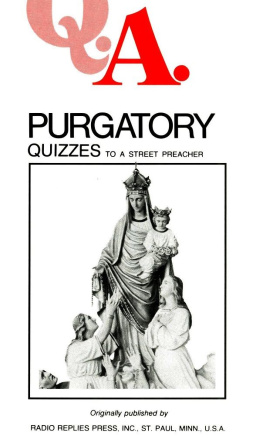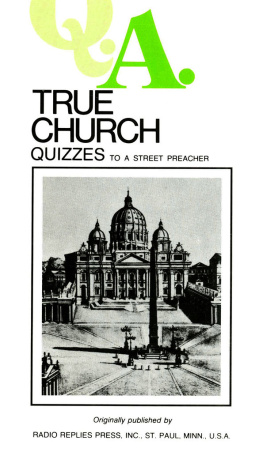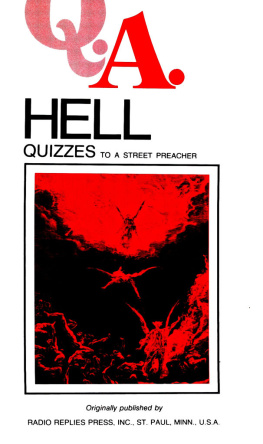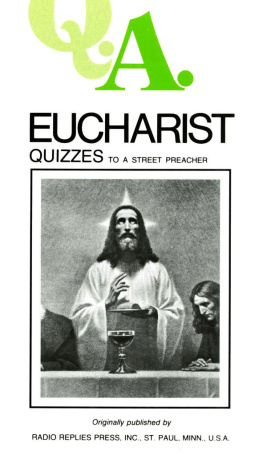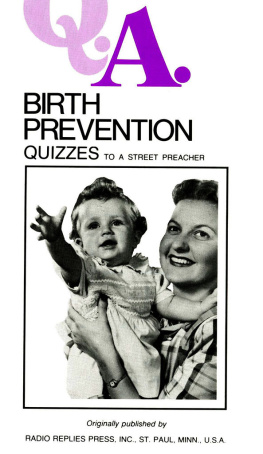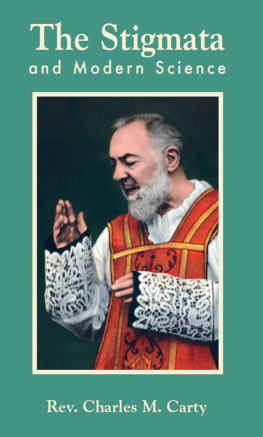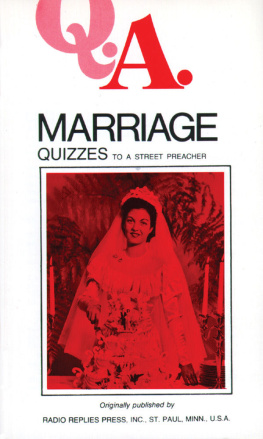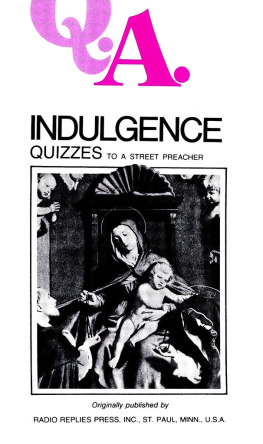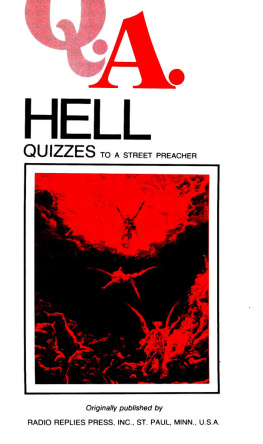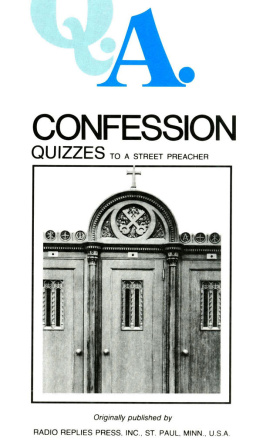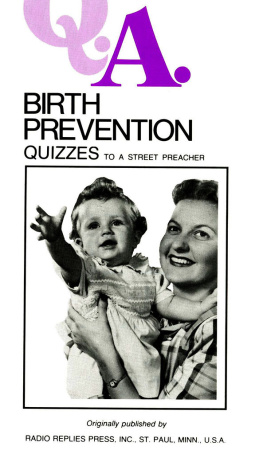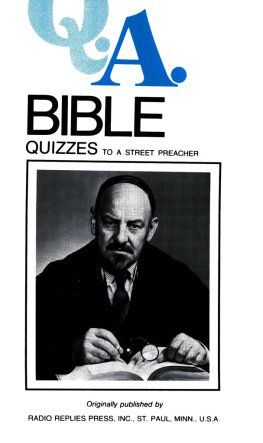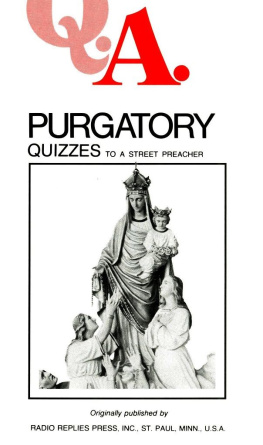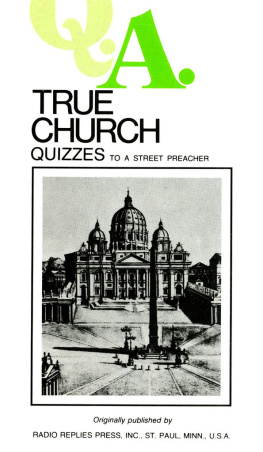Charles Mortimer Carty - Purgatory Quizzes: Quizzes to a Street Preacher
Here you can read online Charles Mortimer Carty - Purgatory Quizzes: Quizzes to a Street Preacher full text of the book (entire story) in english for free. Download pdf and epub, get meaning, cover and reviews about this ebook. year: 1992, publisher: TAN Books, genre: Religion. Description of the work, (preface) as well as reviews are available. Best literature library LitArk.com created for fans of good reading and offers a wide selection of genres:
Romance novel
Science fiction
Adventure
Detective
Science
History
Home and family
Prose
Art
Politics
Computer
Non-fiction
Religion
Business
Children
Humor
Choose a favorite category and find really read worthwhile books. Enjoy immersion in the world of imagination, feel the emotions of the characters or learn something new for yourself, make an fascinating discovery.
- Book:Purgatory Quizzes: Quizzes to a Street Preacher
- Author:
- Publisher:TAN Books
- Genre:
- Year:1992
- Rating:5 / 5
- Favourites:Add to favourites
- Your mark:
- 100
- 1
- 2
- 3
- 4
- 5
Purgatory Quizzes: Quizzes to a Street Preacher: summary, description and annotation
We offer to read an annotation, description, summary or preface (depends on what the author of the book "Purgatory Quizzes: Quizzes to a Street Preacher" wrote himself). If you haven't found the necessary information about the book — write in the comments, we will try to find it.
Charles Mortimer Carty: author's other books
Who wrote Purgatory Quizzes: Quizzes to a Street Preacher? Find out the surname, the name of the author of the book and a list of all author's works by series.
Purgatory Quizzes: Quizzes to a Street Preacher — read online for free the complete book (whole text) full work
Below is the text of the book, divided by pages. System saving the place of the last page read, allows you to conveniently read the book "Purgatory Quizzes: Quizzes to a Street Preacher" online for free, without having to search again every time where you left off. Put a bookmark, and you can go to the page where you finished reading at any time.
Font size:
Interval:
Bookmark:
Purgatory Quizzes
to a Street Preacher
Fr. Chas. M. Carty
&
Rev. Dr. L. Rumble, M.S.C.
Archiepiscopus Sancti Pauli.
Written by
Fr. Chas. M. Carty
&
Rev. Dr. L. Rumble, M.S.C.
Copyright 1976 by TAN Books
Originally published by
Fathers Rumble and Carty
Radio Replies Press, Inc.
St. Paul, Minn., U.S.A.
Complete and Unabridged
TAN Books
Charlotte, North Carolina
www.TANBooks.com
1976
CONTENTS
PURGATORY QUIZZES TO A STREET PREACHER
1. Do the Scriptures speak about praying for the dead?
The Second Book of Machabees tells us that after Judas had defeated Gorgias, he came to bury the slain Jews. "Making a gathering, he sent twelve thousand drachmas of silver to Jerusalem for sacrifice to be offered for the sins of the dead." II Mach. XII, 43. Evidently Judas did not regard their sins to be grievous, for he says, "because he considered that they who had fallen asleep with godliness had great grace laid up for them." That praying for the dead was a Jewish practice is manifested in these words: II Mach. XII, 45. "It is, therefore, a holy and wholesome thought to pray for the dead, that they may be loosed from their sins." II Mach. XII, 46.
2. But the Books of Machabees are not contained in the Protestant Bible so why quote it to prove your doctrine?
The reformers rejected these books from the Bible precisely because they taught the doctrine of praying for the dead. If you Protestants deny that the Books of Machabees are two of the inspired books of the Bible then you must admit them as historical records of Jewish faith in praying for the dead.
3. Does the New Testament speak of your Purgatory?
Not in name but in fact. Mt. 12, 32: "He that shall speak against the Holy Ghost it shall not be forgiven him neither in this world, nor in the world to come." St. Augustine and St. Gregory gather from these words that some sins may be remitted in the world to come; and consequently that there is a Purgatory. St. Paul I Cor. 3, 13-15: "The fire shall try everyman's work of what sort it is. If any man's work burn, he shall suffer loss; but he himself shall be saved, yet so as by fire." St. Paul tells us in these words that the soul shall be judged, suffer for a time and then be saved. The only place to suffer for a time before being saved is Purgatory. St. Mt. 5, 25-26 speaks of the Prison, "and thou be cast into Prison. Amen I say to thee, thou shalt not go out from thence, till thou pay the last farthing ."
4. Did the early Christians believe in Purgatory?
The tombs of the martyrs and the catacombs are filled with definite evidence to prove that the early Christians certainly believed in Purgatory. On their tombs we read: "In your prayers remember us who have gone before you." "Mayest thou have eternal light in Christ." Tertullian (160-240) speaks of anniversary Masses for the dead: "We make on one day every year oblations for the dead, as for their birthdays." "The faithful widow... offers prayers on the anniversary of his death." St. Monica just before dying made this request of her son St. Augustine: "Lay this body anywhere; let not the care of it in any way disturb you. This only I request of you, that you would remember me at the altar of the Lord, wherever you be." St. Augustine then petitions,... "And inspire,... that as many as shall read these words may remember at Thy Altar, Monica, Thy servant." Hence no sane student of history can deny the fact of this universal custom of the early Church, i.e., of praying for the dead because she believed in Purgatory.
5. Did the Jews believe in Purgatory?
Certainly the Jews believed in offering prayers and sacrifice for their departed friends and relatives and they still believe in this custom for they are found always at the Wailing Wall in Jerusalem. In their liturgy for funerals of Hebrews the prayers for the dead read as though they were Catholic prayers for the dead.
6. Did Luther believe in Purgatory?
No. Fr. Conway in "Question Box," says, "Luther's false theory of justification by faith alone led him to deny the distinction between mortal and venial sin, the fact of temporal punishment, the necessity of good works, the efficacy of indulgences, and the usefulness of prayers for the dead. If sin is not remitted but only covered; if the 'New Man' of the Gospel is Christ imputing His own justice to the still sinful man, it would indeed be useless to pray for the dead that they be loosed from their sins. Luther's denial of Purgatory implied either the cruel doctrine that the greater number of even devout Christians were lost, which accounts in some measure for the modern denial of eternal punishment, or the unwarranted assumption that God by 'some sudden, magical change' purifies the soul at the instant of death."
Protestant prayers for the dead, if ever they pray for the dead, are a waste of time and are meaningless unless they admit a Purgatory.
7. Christ sent the good thief immediately into Paradise. I don't see the need of your Purgatory .
The good thief gained Paradise immediately because of his perfect contrition and anyone dying in the state of contrition that is judged perfect by God immediately merits Heaven. Whether our contrition is perfect or imperfect depends on God's judgment. The Book of Wisdom (VII, 25) declares that "nothing defiled cometh" into the presence of the Spirit of Wisdom. St. John in the Apocalypse describes the new Jerusalem and says (XXI, 27), "There shall not enter into it anything defiled." This means that souls must be purified of slight blemishes of venial sins which involve temporal punishment still to be suffered. Common sense tells us that some are not worthy to enter at once into Heaven and that they are not bad enough to be doomed to hell. There must, therefore be an intermediate state where the soul is cleansed of its defilement. It is contrary to nature not to pray for the departed friend or relative. The instinct of nature creates a hope that everything is all right with the departed, and, if not, there is found a latent urge to help with prayer and sacrifice. Purgatory robs death of its terrors. When the Reformers denied this doctrine they drove a stiletto into the Scriptures and the unbroken tradition of the Christian Church. They choked and stifled the inherent cravings of our hearts. If I can pray for my mother when she is alive then why not when she is dead, that she, too, be loosed of her sins? Can we not then hear the cry of Job: "Have pity on me, have pity on me, at least you my friends, because the hands of the Lord hath touched me." Job XIX, 21. Tennyson gives testimony to the natural yearning of the human heart and to the Christian tradition, when he writes:
"I have lived my life, and that which I have done
May He within Himself make pure; but thou,
If thou shouldst never see my face again,
Pray for my soul . More things are wrought by prayer Than this world dreams of. Wherefore, let thy voice Rise like a fountain for me night and day."
8. I am interested in your dogma concerning Purgatory. Must I be a Catholic before I can understand that invention of your Church .
No. You must be a non-Catholic to supect that the Church did invent it. The idea that there is no Purgatory is the invention of Protestants. The Reformers corrupted the true doctrine, and many good Protestants, realizing this, are returning to the Catholic religion of their forefathers. Meantime, if I could discover, or you could show me, when and where the Church invented this doctrine, I promise to spend the rest of my life exposing the Catholic Church as a merely human institution making outrageous claims upon men.
9. Why make people afraid of such a horrible place as Purgatory, when you know that it does not exist?
I know that it does exist. And if you deny it because to you it seems a horrible place, you must deny hell also because it is far more horrible. And if you deny hell, you deny Christianity. And is it not a more horrible thought that there would be no Purgatory? In that case you would have but Heaven and hell. All not quite fit for Heaven could not hope to escape hell. It is a much more pleasant thought that there are people not quite good enough for Heaven, yet not bad enough for hell, and that these are sent to Purgatory until they are purified sufficiently for Heaven.
Next pageFont size:
Interval:
Bookmark:
Similar books «Purgatory Quizzes: Quizzes to a Street Preacher»
Look at similar books to Purgatory Quizzes: Quizzes to a Street Preacher. We have selected literature similar in name and meaning in the hope of providing readers with more options to find new, interesting, not yet read works.
Discussion, reviews of the book Purgatory Quizzes: Quizzes to a Street Preacher and just readers' own opinions. Leave your comments, write what you think about the work, its meaning or the main characters. Specify what exactly you liked and what you didn't like, and why you think so.

